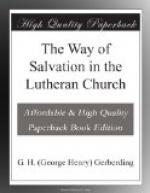These communion seasons become still more effective and valuable when they come, as they generally do in our Lutheran Church, in connection with our great Church Festivals. Our Church has wisely held on to these great historic feasts. They have from the earliest times been the Church’s true revival seasons. Church historians inform us that during the age immediately succeeding the time of the Apostles, when the Church was still comparatively pure and fervently devout, these Festival Seasons were the real high-days, the crowning days of the year. On these occasions the Word was preached with more than ordinary power, and the Sacraments were dispensed with unusual solemnity. Then the churches were filled to overflowing. A solemn stillness reigned over city and country. Worldly cares and pleasures were laid aside, and the great saving facts of the Gospel then commemorated were the all-absorbing theme. At such times, even the worldly and careless felt an almost irresistible impulse to follow the happy Christian to the house of God. Multitudes of sinners were converted and gathered into the Church of Jesus Christ, while saints were strengthened and built up in their holy faith.
Thus these festival communion seasons were true revival seasons. And why should it not be so still? What can be more inspiring and impressive than these great facts which our church festivals commemorate? If the solemn warnings of the Advent season, the glad tidings of the Christmas season, the touching and searching lessons of the Lenten season, the holy, inspiring joyousness of the Easter season, or the instructive admonitions of the Pentecostal season, will not attract and move and edify the hearts of men, what will?
What has the radical part of the Church gained by setting aside these seasons, hallowed by the use of Christ, His apostles and martyrs, the Church Fathers and Reformers? Is the modern revival system and the Week of Prayer arrangement an improvement? Can any modern self-appointed committee get up a better and more effective program than our historic Passion Week services, crowned with its Easter communion? Assuredly no! There can be no new “program,” however broad or spicy, that can be adapted to bless the saint and sinner, like our old order, following the dear Saviour, step by step, on his weary way to the cross and tomb, and thus preaching Christ Crucified for, at least, one whole week in a year. Though there may be progressive Greeks to-day to whom this preaching of Christ Crucified is “foolishness,” or materialistic Jews to whom it is “a stumbling-block,” we know it is still the power of God and the wisdom of God to all who believe. We know that there can be nothing so truly promotive of genuine piety, so well adapted for the conversion of sinners and the sanctifying of believers, as this preaching of the cross. We do not wonder, therefore, that, after a comparatively short experience in the new way, earnest voices are raised, in quarters, whence a few years ago came nothing but ridicule of Lenten services, pleading for the old historic Passion Week, instead of the new Week of Prayer. Not that we object to a week of prayer. We only object to the substitution of this modern week, with its diversified program, for the old week with its Bible Passion lessons.




